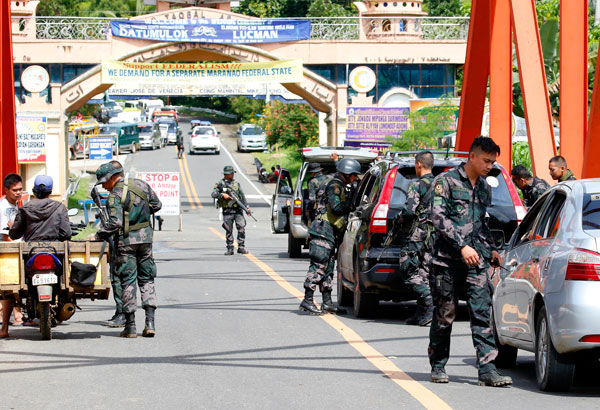YearEnder: Congress 2017 and the resurgence of martial law

Legislators voted 240-27 to allow President Rodrigo Duterte to extend martial law in Mindanao by a year after it lapsed on December 31, 2017. AP/Bullit Marquez, File
MANILA, Philippines — The year 2017 saw Congress approving the first post-Marcos martial law proclamation in a historic vote, although limited to strife-torn Mindanao, and extending it twice – first for five months until Dec. 31 and then for the entire 2018.
This unprecedented move by a joint session of the Senate and the House of Representatives resulted from the Marawi siege, where soldiers took five months to flush out Islamic State (IS)-linked Maute terrorists.
Legislators voted 240-27 to allow President Duterte to extend martial law in Mindanao by a year after it lapsed on Dec. 31, 2017.
Fourteen of the 20 senators present voted in the affirmative. The yes votes of Senators Francis Escudero and Cynthia Villar were not counted as they left the session early.
A total of 226 House lawmakers approved the martial law extension joint resolution as well, while 23 representatives and four senators opposed it.
Executive and defense officials led by Executive Secretary Salvador Medialdea and Defense Secretary Delfin Lorenzana said the extension is needed since “remnants of (terror) groups continue to rebuild through recruitment, training and fund-raising.”
“They are consolidating their forces,” Medialdea said, noting that the IS-inspired Bangsamoro Islamic Freedom Fighters “continues to commit acts of violence, while the Abu Sayyaf remains a serious security concern.”
They also revealed that while the Mautes and other terrorist groups have been “substantially neutralized and the main battle area in Marawi has been liberated, terrorist threats remain.”
“In sum, the factual basis for martial law as affirmed by Congress and the Supreme Court continues to exist. There is still a state of rebellion ready to explode anew at any time,” Medialdea said.
Impeachment complaints
This year also saw the filing of two impeachment complaints in the House committee on justice – first against Commission on Elections chairman Andres Bautista who eventually resigned and second against Chief Justice Maria Lourdes Sereno.
A third one, supposedly against Ombudsman Conchita Carpio-Morales, has yet to be filed.
Bautista, a former chairman of the Presidential Commission on Good Government, was accused by his estranged wife Patricia of amassing ill-gotten wealth amounting to P1.2 billion, which the former law professor didn’t deny, and proudly declared he could explain everything.
More than P300 million of the amount was deposited in a virtually unknown bank, the Luzon Development Bank. The complaint against Bautista was initially thrown out by the justice committee but was overwhelmingly reversed in the plenary after he refused to resign.
Eight of the 15 incumbent Supreme Court justices, and one retired (Arturo Brion), have manifested their desire to testify in the impeachment hearings at the committee on justice headed by Oriental Mindoro Rep. Reynaldo Umali.
So far, four have personally appeared in the House, including Court Administrator Midas Marquez.
The SC chief has been accused by lawyer Lorenzo Gadon of culpable violation of the 1987 Constitution by making unilateral decisions in a collegial body, graft and corruption and betrayal of public trust, among other misdemeanors.
Pieces of legislation
The House leadership under Speaker Pantaleon Alvarez in the current 17th Congress also revived the death penalty bill, one of the campaign promises of President Duterte, who has been vocal in his peace and order campaign even as mayor of Davao City.
The measure was stalled in the Senate, however, since many senators await reelection.
The bill also cost the committee chairmanship posts of many House leaders who voted against its passage, among them former president and now Pampanga Rep. Gloria Arroyo and Batangas Rep. Vilma Recto.
Before the year ended, Congress lowered the personal taxes of fixed-income earners and passed the Tax Reform for Acceleration and Inclusion (TRAIN) bill for the Duterte administration’s massive infrastructure projects.
President Duterte signed the bill lowering the personal income tax into law, which the previous administration had rejected, and TRAIN for his “Build, Build, Build” program.
- Latest
- Trending



























